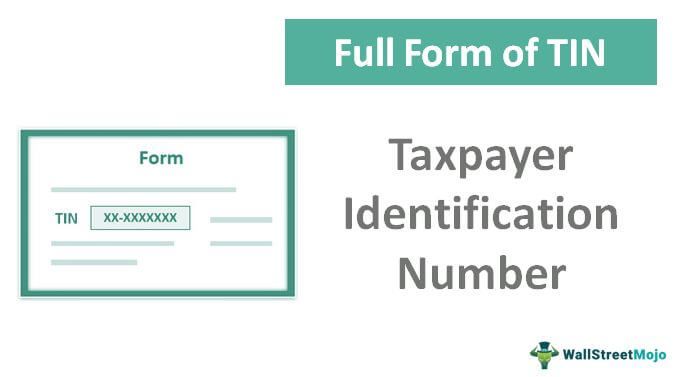Table Of Contents
What is the Full Form of TIN?
The full form of TIN is Taxpayer Identification Number. The TIN refers to the unique combinations of the number of nine digits allotted by the country's government to their taxpayers, be it individual, business entity, or any other person depending on the country's rules for identification of that person in administering the tax laws.

Types of TIN
There are mainly five types of Taxpayer Identification Number that are as listed below:

#1 - Social Security Number (SSN)
SSN or Social Security Number is issued to citizens of the US, its permanent residents, and certain temporary residents. It is required to secure legal employment and receive the country's social security benefits and government services. In addition, the government uses it to keep track of the lifetime earnings and working years of the person. The parents can apply for SSN on behalf of their dependent children.
#2 - Employer Identification Number (EIN)
Employer Identification Number allotted to the businesses includes partnerships, corporations, and some trusts and estates that employ even a single employee. Even if the sole proprietor employs a single employee, it is also required to obtain EIN. The eligible persons use this EIN to report their income for taxation purposes.
#3 - Taxpayer Identification Number for Pending U.S. Adoptions (ATIN)
ATIN is the temporary tax ID number of nine digits allotted to people adopting a child by the IRS in case parents cannot get a timely SSN for the child to file a tax return.
#4 - Individual Taxpayer Identification Number (ITIN)
The IRS issues the Individual Taxpayer Identification Number (ITIN) to certain non-residents of the country and its resident aliens along with their spouses and dependents (if ineligible for SSNs). If the person is not eligible for SSN, they must furnish the Federal Tax return. It must apply to ITIN. To get this, the applicant has to complete Form W-7 along with submitting the necessary documents to support their resident status.
#5 - Preparer Taxpayer Identification Number (PTIN)
The tax ID number of nine digits is allotted to the persons who assist or prepare the Federal Tax returns. All the enrolled agents must have a PTIN.
Example of TIN
A sole proprietor currently has no employed individuals, so no Employer Identification Number exists. But recently, there has been a need to employ an individual in the firm. So, in this case, the sole proprietor has to apply for the Employer Identification Number as for the employee, even a single individual, obtaining the EIN is mandatory.
Uses of TIN
The following are the different uses of the TIN.
- The taxpayers must enter taxpayer-identification numbers on many tax-related documents as required by the Internal Revenue Service, such as tax returns, tax reports, etc. Thus, the IRS uses it for processing all tax-related documents.
- It enables the availability of all tax-related details on one single unified platform.
- Banks use the Taxpayer Identification Numbers and the businesses to interact with the other entities.
- One may use it to apply for a federal loan, open an account with any U.S. financial institution, enroll in medicare, apply for a passport, get a driver's license, etc.
Limitations
The following are the limitations of the Taxpayer Identification Number:
- A person not eligible for the SSIN can obtain ITIN if it meets the specified criteria. However, it cannot use ITIN for claiming the earned Income Tax Credit, and ITIN is also not valid identification outside the tax system.
- The criminals may also use the Taxpayer Identification Number to commit identity theft.
Conclusion
TIN is the abbreviation used for Taxpayer Identification Number. As the name implies, Taxpayer Identification Number is the unique combination of the nine digits allotted by the country's government to their tax to identify that person in administering the tax laws, and the same is required by the person while filing their tax returns. It is a very important number that the person requires in various areas such as applying for a federal loan, enrolling in medicare, applying for a passport, etc.
